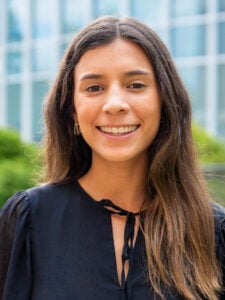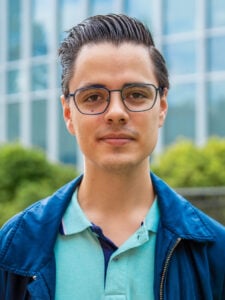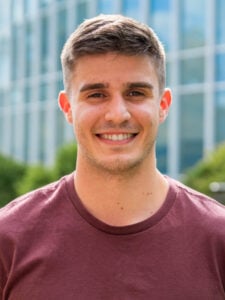This summer saw the launch of the Malone Center’s new internship program, an initiative that emerged from a multi-institutional workshop held at the Universidad Autónoma de Yucatán earlier this year.
“The goal of this event and program is to establish stronger ties with universities in Mexico and Latin America that produce exceptionally strong students who, due to feeling uncompetitive, do not even apply to places like Johns Hopkins,” says Mathias Unberath, a John C. Malone Associate Professor of Computer Science and one of the organizers of the program.
Three interns were selected from a pool of applicants to be hosted by Johns Hopkins faculty initially for three months; all have since chosen to stay on longer to continue work on their research projects.
Learn more about the Malone Center Summer Internship Program’s inaugural cohort of interns below:

Alejandra Perez Rondon
Alejandra Perez Rondon is working with Mathias Unberath on creating digital twins of complex environments such as operating rooms to monitor health- and safety-critical events and provide decision support.
“In simple terms, this means using computer models to replicate what happens during a surgery in a 3D digital environment by retrieving and processing data from cameras and sensors,” says Perez Rondon. “This research is fascinating because it merges technical fields like computer vision and AI with real-world applications in health care, ensuring patient safety and better outcomes.”
Originally from Venezuela, Perez Rondon completed her bachelor’s and master’s degrees in biomedical engineering at the Universidad de los Andes in Colombia, where she focused her research on computer vision and surgical data science—specifically training and applying AI models to understand surgical workflows.
“I wanted to use this internship to deepen my experience in surgical data science,” Perez Rondon says. “And the opportunity to work with Professor Unberath is perfect because of the groundbreaking research happening at Johns Hopkins around this same topic.”

Héctor Manuel Ramírez Alatorre
Héctor Manuel Ramírez Alatorre is a fifth-year mechatronics engineering major from Mexico interested in electronic design, controls, and robotics. Hosted by Alejandro Martin-Gomez, an assistant research professor of computer science, Ramírez Alatorre is designing the hardware and software for surgical continuum manipulators, or flexible robotic devices used in surgical procedures.
“This kind of project requires you to know a little in many areas, like mechanics, electronics, and programming,” says Ramírez Alatorre. “It’s very enjoyable research—and it’s even better when you actually know that your work will be used in real situations and will have a real impact on people’s lives.”
Ramírez Alatorre joined the Malone Center Summer Internship Program to get hands-on experience in biomedical engineering research, the field in which he hopes to pursue a master’s degree.

Nicolás Varela Long
Nicolás Varela Long is working on methods for interpretable machine learning in biomedical imaging under the guidance of Jeremias Sulam, an assistant professor of biomedical engineering, computer science, and applied mathematics and statistics. Together, they will be testing how certain key concepts influence AI models’ decisions.
“By doing this, we can better understand and explain how these models work, which is crucial for building trust in the AI systems used in health care,” says Varela Long. “For example, if a model detects an abnormality in a chest X-ray, we can analyze which features—like an enlarged heart or lung opacity—were most important in the model making that prediction. This type of work not only improves the model’s performance, but also makes its reasoning more transparent for clinicians.”
Originally from Uruguay, Varela Long is pursuing a bioengineering degree at the Universidad Nacional de Entre Río in Argentina. Although his primary academic focus is on translating engineering solutions into clinical or biomedical settings, he’s worked on diverse topics within this spectrum, including signal processing for evaluating speech pathologies, improving clinical engineering processes in hospitals, and now machine learning for medical imaging.
“The opportunity to conduct research at such a prestigious institution in the field of healthcare engineering is rare for students from my region,” says Varela Long. “When I found out about the Malone Center’s program to support Latin American students, I didn’t hesitate to apply—it’s a unique chance to grow both personally and academically, surrounded by top experts in the field and immersed in a world-class academic ecosystem.
Image Caption: Alejandra Perez Rondon, Nicolás Varela Long, and Héctor Manuel Ramírez Alatorre
